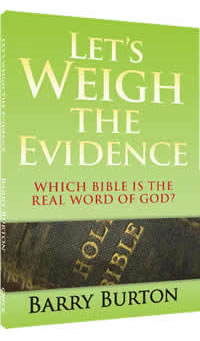Is 1 John 5:7 not in any Greek manuscript before the 1600s? If it is true, why is it in the KJV?

From "Answers To Your Bible Version Questions"
© 2001 by David W. Daniels
Question: Is it true that 1 John 5:7 is not in any Greek manuscript before the 1600s? If that is true, why is it in the King James Bible?
Answer: 1 John 5:7 belongs in the King James Bible and was preserved by faithful Christians. But the passage was removed from many Greek manuscripts, because of the problems it seemed to cause.
It is true that there is a small number of Scriptures that are not the same between the King James Bible and the so-called "Majority" Greek text. There are a number of reasons for this:
- The so-called "Majority" text was not really based on the majority of texts, but rather a relatively small number of manuscripts. The last person to try to find the differences between the majority of Greek manuscripts, Dr. Von Soden, did not collate more than 400 of the more than 5,000 Greek texts. In other words, what is commonly called the "Majority" Greek text is not a collation of the majority of manuscripts at all.
- The "Majority" Greek text is also the main Greek text used by the Eastern Orthodox religion. They had a vested interest in changing (or deleting) some texts. More on this in a moment.
- 1 John itself is not in a large number of extant Greek manuscripts.
So why then is 1 John 5:7 in the King James Bible, but not in many of the existing Greek manuscripts? To understand the answer, we must look at the history of what happened shortly after the Bible was written.
The Greek and Roman Institutions
During the early growth of the Christian church, ministers (whether saved or not) wrote down doctrines that they said were Christian and Biblical. Starting after the death of the apostles (about 100 AD) many people taught the lie that Jesus was not God the Son and Son of God, or that Jesus became God at His baptism, or the false doctrine that the Holy Spirit was not God or was not eternal.
The growing religion that became known as Roman Catholic, after many debates eventually agreed on the doctrine of the Trinity. So they had no reason to remove 1 John 5:7 from their Bibles, since it supported what they taught.
But the Greek Eastern Orthodox religion was combating a heresy called "Sabellianism," and would have found it easier to combat the heresy by simply removing the troubling passage from their Bibles.
A Trail of Evidence
But during this same time, we find mention of 1 John 5:7, from about 200 AD through the 1500s. Here is a useful timeline of references to this verse:
| 200 AD | Tertullian wrote "which three are one" based on the verse in his Against Praxeas, chapter 25. |
| 250 AD | Cyprian of Carthage, wrote, "And again, of the Father, Son, and Holy Ghost it is written: "And the three are One" in his On The Lapsed, On the Novatians, (see note for Old Latin) |
| 350 AD | Priscillian referred to it [Corpus Scriptorum Ecclesiasticorum Latinorum, Academia Litterarum Vindobonensis, vol. xviii, p. 6.] |
| 350 AD | Idacius Clarus referred to it [Patrilogiae Cursus Completus, Series Latina by Migne, vol. 62, col. 359.] |
| 350 AD | Athanasius referred to it in his De Incarnatione |
| 398 AD | Aurelius Augustine used it to defend Trinitarianism in De Trinitate against the heresy of Sabellianism |
| 415 AD | Council of Carthage appealed to 1 John 5:7 when debating the Arian belief (Arians didn't believe in the deity of Jesus Christ) |
| 450-530 AD | Several orthodox African writers quoted the verse when defending the doctrine of the Trinity against the gainsaying of the Vandals. These writers are: A) Vigilius Tapensis in "Three Witnesses in Heaven" B) Victor Vitensis in his Historia persecutionis [Corpus Scriptorum Ecclesiasticorum Latinorum, Academia Litterarum Vindobonensis, vol. vii, p. 60.] C) Fulgentius in "The Three Heavenly Witnesses" [Patrilogiae Cursus Completus, Series Latina by Migne, vol. 65, col. 500.] |
| 500 AD | Cassiodorus cited it [Patrilogiae Cursus Completus, Series Latina by Migne, vol. 70, col. 1373.] |
| 550 AD | Old Latin ms r has it |
| 550 AD | The "Speculum" has it [The Speculum is a treatise that contains some good Old Latin scriptures.] |
| 750 AD | Wianburgensis referred to it |
| 800 AD | Jerome's Vulgate has it [It was not in Jerome's original Vulgate, but was brought in about 800 AD from good Old Latin manuscripts.] |
| 1000s AD | miniscule 635 has it |
| 1150 AD | minuscule ms 88 in the margin |
| 1300s AD | miniscule 629 has it |
| 157-1400 AD | Waldensian (that is, Vaudois) Bibles have the verse |
| 1500 AD | ms 61 has the verse |
| Even Nestle's 26th edition Greek New Testament, based upon the corrupt Alexandrian text, admits that these and other important manuscripts have the verse: 221 v.l.; 2318 Vulgate [Claromontanus]; 629; 61; 88; 429 v.l.; 636 v.l.; 918; l; r. |
The Vaudois
Now the "Waldensian," or "Vaudois" Bibles stretch from about 157 to the 1400s AD. The fact is, according to John Calvin's successor Theodore Beza, that the Vaudois received the Scriptures from missionaries of Antioch of Syria in the 120s AD and finished translating it into their Latin language by 157 AD. This Bible was passed down from generation, until the Reformation of the 1500s, when the Protestants translated the Vaudois Bible into French, Italian, etc. This Bible carries heavy weight when finding out what God really said. John Wesley and Jonathan Edwards believed, as most of the Reformers, that the Vaudois were the descendants of the true Christians, and that they preserved the Christian faith for the Bible-believing Christians today.
Who Has the Most to Gain? Who Has the Most to Lose?
The evidence of history shows us that the Roman Catholic religion was relentless in its effort to destroy the Vaudois and their Bible. It took them until the 1650s to finish their hateful attacks. But the Vaudois were successful in preserving God's words to the days of the Reformation.
Now we have to ask ourselves a question: Who had the most to gain by adding to or taking away from the Bible? Did the Vaudois, who were being killed for having their Bibles, have anything to gain by adding to or taking from the words of God? Compromise is what the Roman religion wanted! Had the Vaudois just followed the popes, their lives would have been much easier. But they counted the cost. This was not politics; it was their life and soul. They above all people would not want to change a single letter of the words they received from Antioch of Syria. And they paid for this with their lives.
What about the "scholars" at Alexandria, Egypt? We already know about them. They could not even make their few 45 manuscripts agree. How could we believe they preserved God's words?
The Reformation itself owes a lot to these Christians in the French Alps. They not only preserved the Scriptures, but they show to what lengths God would go to keep his promise (Psalm 12:6-7).
And that's only part of the story about the preservation of God's words.
- See more articles on related topics:
- Bible Versions
- King James Bible
- Bible Translation
- History of Preservation
Products of interest:
-

Answers to Your Bible Version Questions
224 pages
David W. Daniels answers difficult questions about the KJV. Learn how to defend the KJV and why you can trust it. -

Look What's Missing!
256 pages
For years, publishers have been removing words, and even whole verses, from modern Bibles. What's missing from your Bible? Take a look! -

Let's Weigh the Evidence
96 pages
In simple language, this book provides the basics of the Bible version issue, showing why the King James is the only Bible you can trust. Compare the solid history of the King James Bible with the new Bibles that remove Christ’s Virgin Birth and His Second Coming. Learn about Westcott and Hort’s bait-and-switch, missing verses and words, the Living Bible’s tampering, copyright issues, and more! -

Understandable History of the Bible
557 pages
You'll learn the history of the Bible in this well-documented but easy-to-understand book. -

Sabotage?
32-PAGE, FULL COLOR COMIC BOOK - See the struggle through the ages to keep God’s Word pure, and learn which Bible can be trusted... and why!
